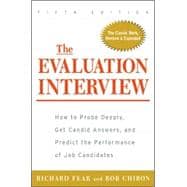
What is included with this book?
Richard Fear is a leading expert in the field of interviewing. A licensed industrial psychologist, past vice president of The Psychological Corporation, and faculty member emeritus of Columbia University, Fear has trained thousands of interviewers in the U.S. and abroad.
Robert Chiron, Ph.D., is president of Chiron Groupa consulting firm specializing in creating alignment and unleashing potential in organizationswhose clients range from small businesses to Fortune 100 corporations. He formerly taught at the University of Iowa and Columbia University.
| Preface to the Fifth Edition | ix | ||||
| Part One. Before the Interview | 1 | (38) | |||
|
3 | (7) | |||
|
3 | (7) | |||
|
10 | (19) | |||
|
10 | (6) | |||
|
16 | (3) | |||
|
19 | (1) | |||
|
20 | (2) | |||
|
22 | (2) | |||
|
24 | (1) | |||
|
25 | (3) | |||
|
28 | (1) | |||
|
29 | (10) | |||
|
31 | (1) | |||
|
32 | (1) | |||
|
33 | (2) | |||
|
35 | (1) | |||
|
36 | (1) | |||
|
36 | (1) | |||
|
37 | (2) | |||
| Part Two. Interviewing Tactics | 39 | (62) | |||
|
41 | (7) | |||
|
42 | (4) | |||
|
46 | (2) | |||
|
48 | (11) | |||
|
49 | (2) | |||
|
51 | (2) | |||
|
53 | (1) | |||
|
53 | (1) | |||
|
54 | (1) | |||
|
54 | (2) | |||
|
56 | (1) | |||
|
57 | (2) | |||
|
59 | (14) | |||
|
59 | (1) | |||
|
60 | (1) | |||
|
61 | (1) | |||
|
61 | (1) | |||
|
61 | (4) | |||
|
65 | (4) | |||
|
69 | (2) | |||
|
71 | (2) | |||
|
73 | (11) | |||
|
74 | (1) | |||
|
74 | (2) | |||
|
76 | (1) | |||
|
76 | (1) | |||
|
77 | (3) | |||
|
80 | (2) | |||
|
82 | (1) | |||
|
83 | (1) | |||
|
84 | (7) | |||
|
85 | (1) | |||
|
85 | (2) | |||
|
87 | (1) | |||
|
88 | (1) | |||
|
89 | (1) | |||
|
89 | (1) | |||
|
90 | (1) | |||
|
91 | (10) | |||
| Part Three. Interpreting the Candidate's Responses | 101 | (68) | |||
|
103 | (13) | |||
|
103 | (1) | |||
|
104 | (3) | |||
|
107 | (9) | |||
|
116 | (23) | |||
|
116 | (18) | |||
|
134 | (2) | |||
|
136 | (3) | |||
|
139 | (10) | |||
|
140 | (7) | |||
|
147 | (2) | |||
|
149 | (20) | |||
|
149 | (1) | |||
|
150 | (1) | |||
|
151 | (1) | |||
|
152 | (1) | |||
|
153 | (3) | |||
|
156 | (8) | |||
|
164 | (1) | |||
|
165 | (1) | |||
|
166 | (1) | |||
|
167 | (2) | |||
| Part Four. Additional Applications of Interview Techniques | 169 | (50) | |||
|
171 | (10) | |||
|
172 | (1) | |||
|
172 | (3) | |||
|
175 | (1) | |||
|
176 | (1) | |||
|
176 | (1) | |||
|
177 | (1) | |||
|
177 | (1) | |||
|
178 | (1) | |||
|
178 | (3) | |||
|
181 | (16) | |||
|
181 | (1) | |||
|
182 | (1) | |||
|
183 | (1) | |||
|
183 | (2) | |||
|
185 | (4) | |||
|
189 | (1) | |||
|
190 | (7) | |||
|
197 | (4) | |||
|
197 | (1) | |||
|
198 | (3) | |||
|
201 | (6) | |||
|
201 | (2) | |||
|
203 | (1) | |||
|
204 | (1) | |||
|
205 | (1) | |||
|
206 | (1) | |||
|
207 | (12) | |||
|
208 | (1) | |||
|
209 | (1) | |||
|
210 | (1) | |||
|
211 | (2) | |||
|
213 | (1) | |||
|
213 | (1) | |||
|
214 | (1) | |||
|
215 | (1) | |||
|
216 | (1) | |||
|
217 | (2) | |||
| Appendix A. The Evaluation Interview Guide | 219 | (4) | |||
| Appendix B. Evaluation Interview Note-Taking and Rating Forms | 223 | (5) | |||
| Appendix C. Sample Report of Interview Findings | 228 | (6) | |||
| Appendix D. Guidelines for Giving and Receiving Feedback | 234 | (2) | |||
| Index | 236 |
The New copy of this book will include any supplemental materials advertised. Please check the title of the book to determine if it should include any access cards, study guides, lab manuals, CDs, etc.
The Used, Rental and eBook copies of this book are not guaranteed to include any supplemental materials. Typically, only the book itself is included. This is true even if the title states it includes any access cards, study guides, lab manuals, CDs, etc.